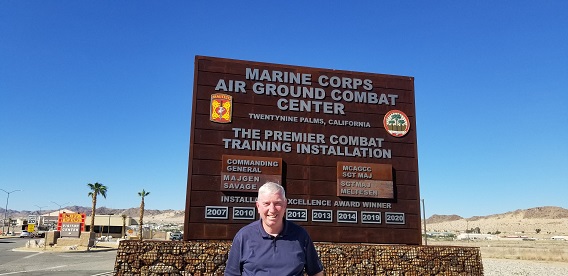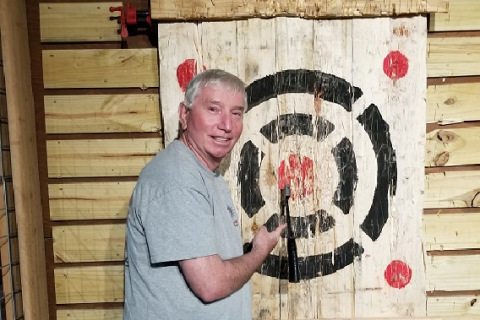Mesothelioma Survivor Is Passionate About Raising Awareness

Fact Checked | Written by: Travis Rodgers | Last Update: 10/24/2024 | 5 Min Read
Kevin Hession is passionate about sharing his story and reaching out to other mesothelioma survivors. His goal is to raise awareness about this rare malignant cancer and to help others who are on similar mesothelioma journeys.
“This is like a vocation to me now,” Kevin told The Mesothelioma Center at Asbestos.com. “This is something that I have, but this is something that I can give back to. I would say I’m a success story so far, but my story isn’t finished.”
He shared with us that he wants to make sure people know they’re not alone. Kevin was diagnosed with pleural mesothelioma in August 2021.
“I’m trying to use every moment I have to talk to people and give them some sort of encouragement so they don’t have the fears that I had,” Kevin shared with us. “I don’t want them to feel isolated. I tell them there are people out there who want to help, whether it be someone like me or your spouse or your best friend from 20 years ago.”
Mesothelioma Awareness and Helping Others Stay Strong
Kevin said his mindset is to let as many people know about his story as possible to help raise awareness about mesothelioma. He believes awareness not only helps patients understand their disease, but it can help others understand how they can help.
“I feel that mesothelioma is so rare that people don’t understand it,” Kevin said. “Maybe I can help people understand what this disease is and what people can do to help.”
He also wants to make sure that anyone taking care of someone with mesothelioma is getting the care they also require. Caregiver burnout is common among mesothelioma caregivers.
“People who are taking care of mesothelioma patients also play a vital role and shouldn’t be forgotten,” he emphasized. “Mesothelioma caregivers are going to have good days and bad days just like I’m going to have good days and bad days. You have to take care of the caregivers. That’s a very important concept. I don’t know how somebody can deal with this by themselves.”
As stressful as it can be to be a mesothelioma survivor and a caregiver, Kevin noted there are opportunities to support one another. He feels relationships can be strengthened on the journey.
“It’s important for you as the mesothelioma patient to be sure to support your principal caregiver in return to the best of your ability,” Kevin said. “Use the fact that you have mesothelioma or if you’re the caregiver the spouse has mesothelioma use this as an opportunity to get closer to them.”
It’s important for survivors and caregivers alike to know they’re not alone. He added that it’s important for both to ask themselves: “What can we do to continue to have a good life?”
Kevin also shared that in his conversations with other survivors he finds, “Sometimes people feel embarrassed that they have this problem. I’m not afraid to share my mesothelioma story. I think I’m a heck of a lot better of a person than I was before I had mesothelioma.”
Kevin’s Military and Professional Background
As a former Commissioned Officer in the U.S. Marine Corps, Kevin was stationed in many parts of the country. Some of his travels included being stationed in Virginia and California, as well as spending time in Japan.
Following his military service, Kevin’s first civilian job was as a stockbroker in 1987. He held several corporate positions over the course of many decades. He then served as the director of human resources and professional development for MSL CPAs and Advisors.
Kevin’s mesothelioma diagnosis contributed to his decision to retire early in January 2023. It wasn’t an easy decision. He said he wanted to continue working, but was concerned about the physical demands of his professional schedule.
“One of the reasons I retired was because of the mesothelioma,” Kevin told us. “The modern HR practitioner doesn’t work a 40 hour work week, particularly at higher levels. You’re working at least a 50 hour work week.”
He and his boss discussed Kevin’s concerns about his schedule. He also said he was concerned he might have to leave his job suddenly.
“When I had a long conversation with my company’s president, I told him I might be able to work 25 hours a week, but I can’t work a 50 hour work week,” he recalled. “I could get a CT scan that shows the disease has progressed.”
But when he asks himself “What can I do to continue to have a good life?” he told us he’s found meaningful opportunities in this life change. He’s using his retirement for raising mesothelioma awareness and actively working with others. He volunteers weekly at the hospital where he had his decortication surgery, offering holy communion to patients and support.
He’s careful about his nutrition and exercises regularly as well. He believes a healthy diet and his exercise regimen have helped him improve symptoms and manage treatment side effects.





